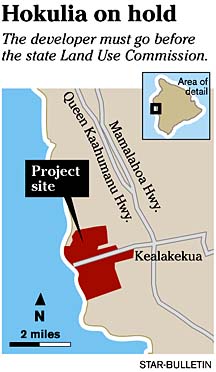
Judge halts Big Island’s
Hokulia developmentThe developer is building
on land classified as agricultural
KEALAKEKUA, Hawaii >> Kona Circuit Judge Ronald Ibarra has ordered a halt to work at the 1,550-acre Hokulia luxury residential project in Kona until the developer obtains urban classification for the land.
Most of the land is now classified by the state as agricultural.
"Despite being located primarily on agricultural land, Hokulia is a private, luxury resort residential subdivision," Ibarra said in his ruling.
He ordered work to stop until the developer, 1250 Oceanside Partners, goes before the state Land Use Commission to obtain reclassification.
He also voided a county ordinance that gave zoning approval for a hotel-like lodge on the property.
However, Ibarra allowed work to continue on a shoreline park and on a golf course, neither of which requires urban classification.
Reclassification by the state commission sometimes takes years.
Attorney Robert Kim, who represents Kona resident Walter "Jack" Kelly and others opposing Hokulia, said a comparable case took place when Kim represented clients opposing a project at Kaupulehu.
A court decision required that development to go to the Land Use Commission, and 13 years later, the Kaupulehu project has not been built. Kim predicted a similar outcome for Hokulia.
A second group of opponents of Hokulia, the Protect Keopuka Ohana, are represented by the Native Hawaiian Legal Corp.
"Our clients have always maintained that million-dollar luxury homes, a clubhouse and a golf course are not agriculture," Native Hawaiian Legal Corp. attorney Alan Murakami said.
Oceanside ignored state law to "fast-track" the project, he said.
Oceanside President John De Fries said he would wait until today to make a statement. "The implications are immense. We need time to evaluate this," he said.
Ibarra noted in his ruling that Oceanside has spent $136 million to develop the project of 730 1-acre house lots. The company has sold more than 190 lots, the judge wrote.
But the Hokulia marketing plan does not mention agriculture, he wrote.
In 1994 the company's own attorney warned that a separate court ruling said buildings on agricultural land must be "farm dwellings."
"The Hokulia residences are not farm dwellings," Ibarra wrote.
Oceanside argued that it has done so much work that it has "vested" rights that the court should not remove. Ibarra replied that the company has vested rights to use the land for agriculture. It does not have vested rights to build luxury homes, he wrote.
"Any reasonable developer would have consulted with the LUC (Land Use Commission) between 1989 and 1995," Ibarra wrote.
Oceanside itself said in a 1993 environmental study that the project needed a land use change to urban classification, Ibarra wrote. It later dropped the reference to the commission.
